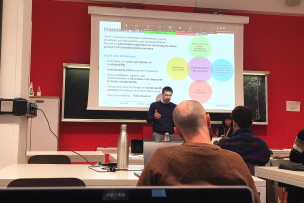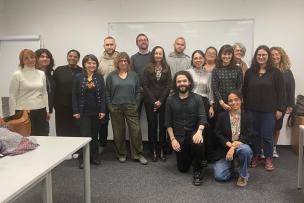How to write and publish your paper (Research Training Academy)

This training will introduce the concepts of scientific writing and the procedures to publish scientific papers in international journals. PhD students will get practical advice and guidance on how to structure a research article, how to write it and how to get it published; explaining every step of the process, from choosing a suitable journal for your work, to presenting the results and citing references. We will work on your writing skills and discuss important ethical issues in scientific publishing.
Training objectives
By the end of the training participants:
- understand successful science writing techniques
- know how to organise, outline and plan papers
- are able to construct effective sentences and paragraphs
- understand the elements of a paper and what each element should contain
- have increased their awareness of ethical issues associated with science publishing
- have an insight into what it takes to get published in top-ranked journals
Content
- Planning your paper: Outline, motivation, content, novelty and originality
- Elements of a paper: Abstract and title, introduction, methods, results, discussion and conclusion
- Submission and publication: Choosing the right journal, publishing in high impact journals, submitting your paper, editorial processes, peer review, getting accepted, appeals
- Writing: Sentences, paragraphs, flow of text, style of writing, reducing wordiness
- Ethics in scientific publishing: Plagiarism and fabrication, authorship, references and citations
Teaching Methods
The training is in the format of active learning, a combination of informative PowerPoint lectures followed by practical tasks. These tasks involve editing and improving each section of your paper. A script with exercises will be provided. Since this training is about writing scientific publications in English, it will be held in English.
Pre-training task
Please collect three or four recent research papers in your field from the journals you usually read and want to publish in. Photocopy them and bring them along. No chapter from books, no review papers please!
Your target research articles should:
- Be written by a researcher/research team based at an English-speaking institution, ideally a native speaker of English
- Be reasonably short (less than 15 A4 pages including graphs and tables)
- Deal with subject matter which is as close as possible to your own topic and the kind of research you are writing up
- Have clearly defined introduction, methodology, results and discussion/conclusion sections. These subtitles may vary in different fields and journals. For example “Methodology” could be called “Procedure”, “Materials and Methods”, “Experimental” or some other variation.
Wondering if your English level is sufficient? If you have managed to read this far, you will be able to follow this training and get help for writing better scientific papers!
Dates
- Group 1: Thu 11 April, 9:00-16:00 CEST / 8:00-15:00 BST AND Thu 18 April, 9:00-16:00 CEST / 8:00-15:00 BST AND Thu 25 April, 9:00-16:00 CEST / 8:00-15:00 BST
- Group 2: Mon 29 April, 9:00-16:00 CEST / 8:00-15:00 BST AND Mon 13 May, 9:00-16:00 CEST / 8:00-15:00 BST AND Mon 27 May, 9:00-16:00 CEST / 8:00-15:00 BST
Total duration: 18 hours (3 days)
Trainer
Gabriele Hess-Fernandez, senior science journalist, editor-in-chief and university lecturer, Nantes Université
Application process
Application deadline: 1 April 2024
Please apply via the following link: https://questionnaires.univ-nantes.fr/index.php/226163?lang=en
Candidates may only apply if they can attend on all 3 dates.
Only 18 spots are available for this training. Please note that the workshop has a limited number of spots. Each EUniWell university has an equal number of seats and applications are accepted on a first-come, first-served basis. If registrations exceed capacity, a waiting list may be implemented. In any case, you will be informed whether you are on the main list or on the waiting list.
To join the training, participants will need to accept the trainer’s invitation and log into the provided Google Classroom link. The trainer will upload presentations and working materials to Classroom before and during the training. If a participant cannot log in by using their university email address, they can try with a Gmail account. If they have any difficulties, they are encouraged to reach out tothe organising team as soon as possible.
Contact
For more information about this training, please contact the Nantes Université team: euniwell[at]univ-nantes.fr
Further information
This workshop is part of the Research Training Academy under the EUniWell #Research project which receives funding from the European Union’s Horizon 2020 research and innovation programme under grant agreement No 101035821.


